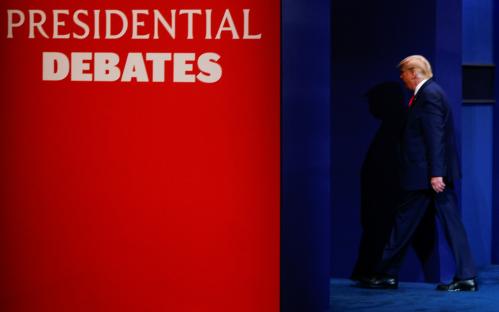It should come as no surprise to observers of Donald Trump’s political career, that his endorsements in the 2022 midterms are chaotic and controversial, but they are also not nearly as decisive as he would like them to be. Recently, the Republican establishment in Pennsylvania was shocked and disappointed by Trump’s endorsement of Dr. Mehmet Oz in the Republican primary race for the U.S. Senate. In Ohio, some Republicans are trying to prevent a Trump endorsement of J.D. Vance, who, like Dr. Oz, has a less than stellar track record when it comes to conservative issues. And in Georgia, Trump has given David Purdue, the former senator who is challenging one of Trump’s nemeses Gov. Brian Kemp, a large influx of cash in an effort to help his sagging campaign.
In these high-profile primaries and in other less publicized primaries, the Trump magic is not nearly as powerful as conventional wisdom (and Trump himself) would have it. Take a look at the following chart which is a snapshot in time of how Trump candidates are doing financially. It does not include Trump-endorsed incumbents for one reason, incumbent re-election rates in primaries are extremely high (98%) so endorsements of incumbents don’t really test the endorser’s political impact.

The chart looks at the money candidates have on hand for their primaries according to their first quarter FEC reports. Of course, these are subject to change in the future—some of these primaries don’t happen till the summer and Trump has barely begun to open his war chest for his favorite candidates. Nonetheless, in order to get an early look at Trump’s endorsement clout, we calculated the total cash on hand among all the candidates who filed with the FEC and then calculated the percentage of that cash that was held by the person Trump endorsed.
So far, there are fifteen Trump candidates who do not have more than 50% of the cash on hand in their races, although four of those candidates are in multi-candidate races and have more money than their opponents. There are only six Trump candidates who have substantially more cash on hand at this point than their opponents. This is subject to change, of course. For instance, Trump endorsed Dr. Oz in Pennsylvania after the first quarter FEC filings were in. And yet, as Trump’s emergency infusion of money into his Georgia candidate shows, his endorsement doesn’t result in easy money. In the race for campaign cash, most Trump endorsees are having to fight for money.
There’s an old saying in politics, which became the moniker of EMILY’s List, an organization founded to raise money for women candidates—“Early Money is like yeast.” It was a clever play on Emily, but its message is profound, not just for women but for all candidates at any time. Early money helps a candidate hire professional staff, lock in ad time on radio and TV and, importantly, raise more money. So far, most of Trump’s non-incumbent candidates are behind in the money primary.
Some weeks ago, I looked at Trump’s political hold on the Republican Party and speculated that he could turn out to be “the little man behind the curtain in The Wizard of Oz,” (and in the case of the Pennsylvania Senate race, quite literally). A man whose roar is greater than his actual strength.
The Brookings Institution is committed to quality, independence, and impact.
We are supported by a diverse array of funders. In line with our values and policies, each Brookings publication represents the sole views of its author(s).







Commentary
Trump endorsements—no slam dunk so far
April 15, 2022